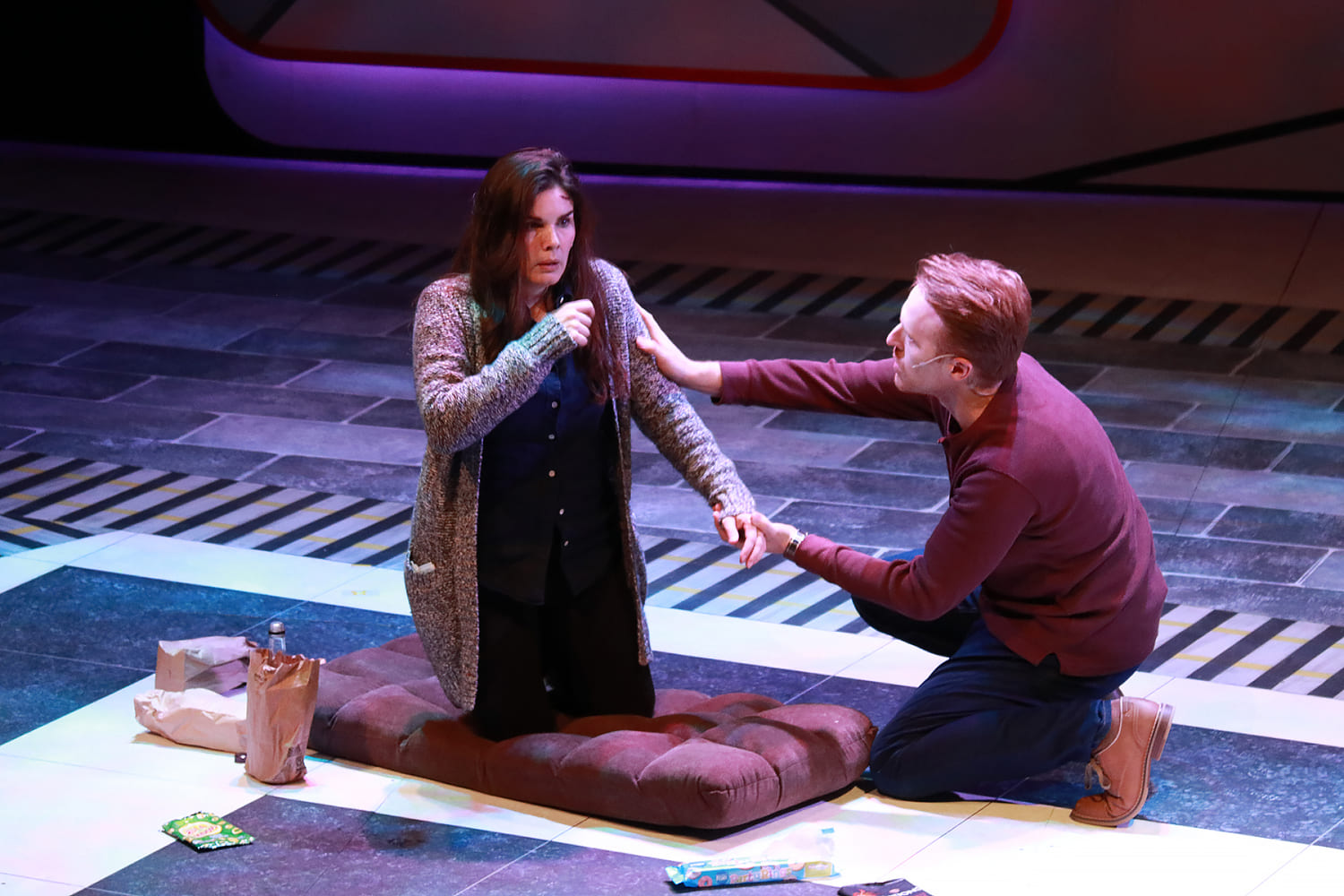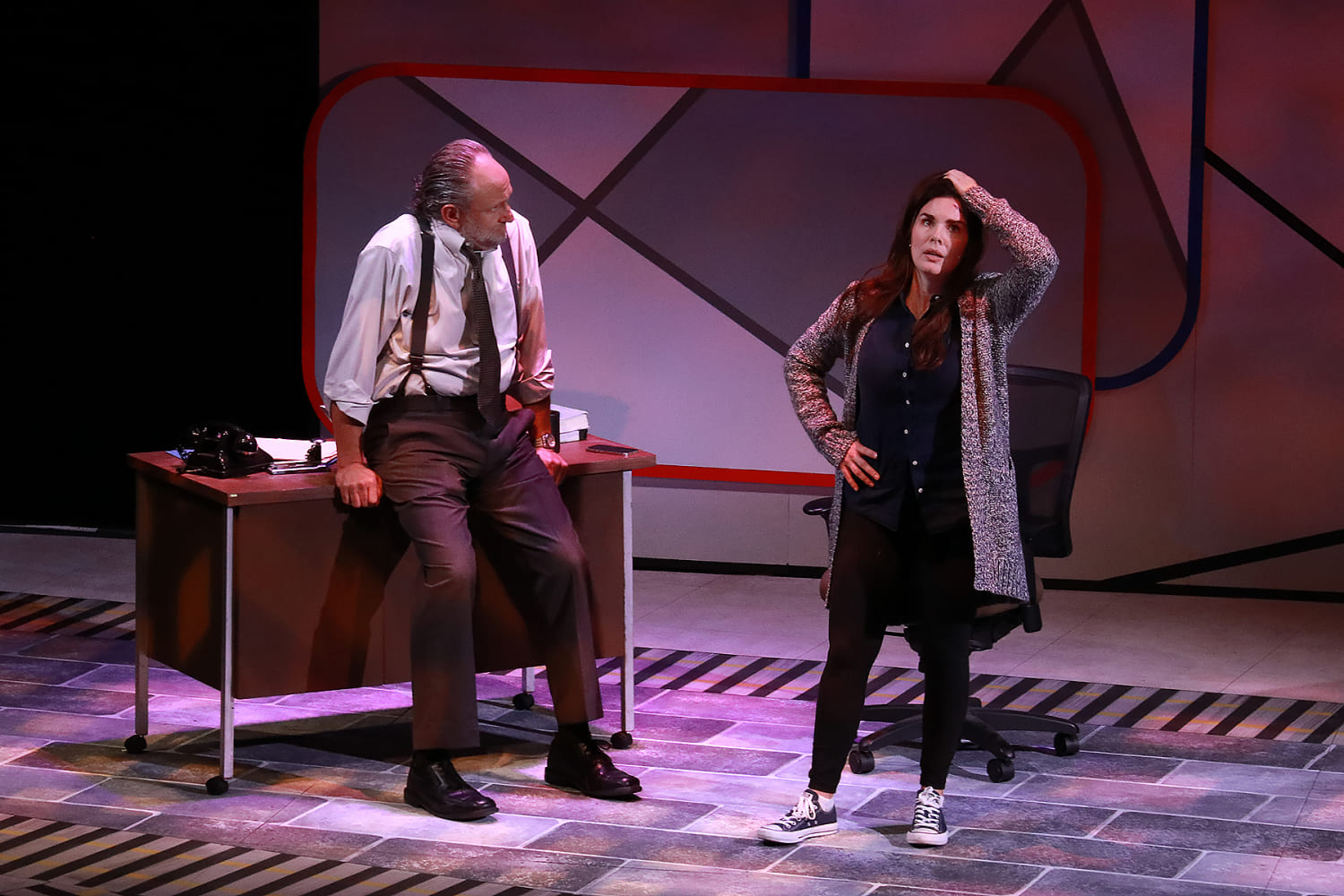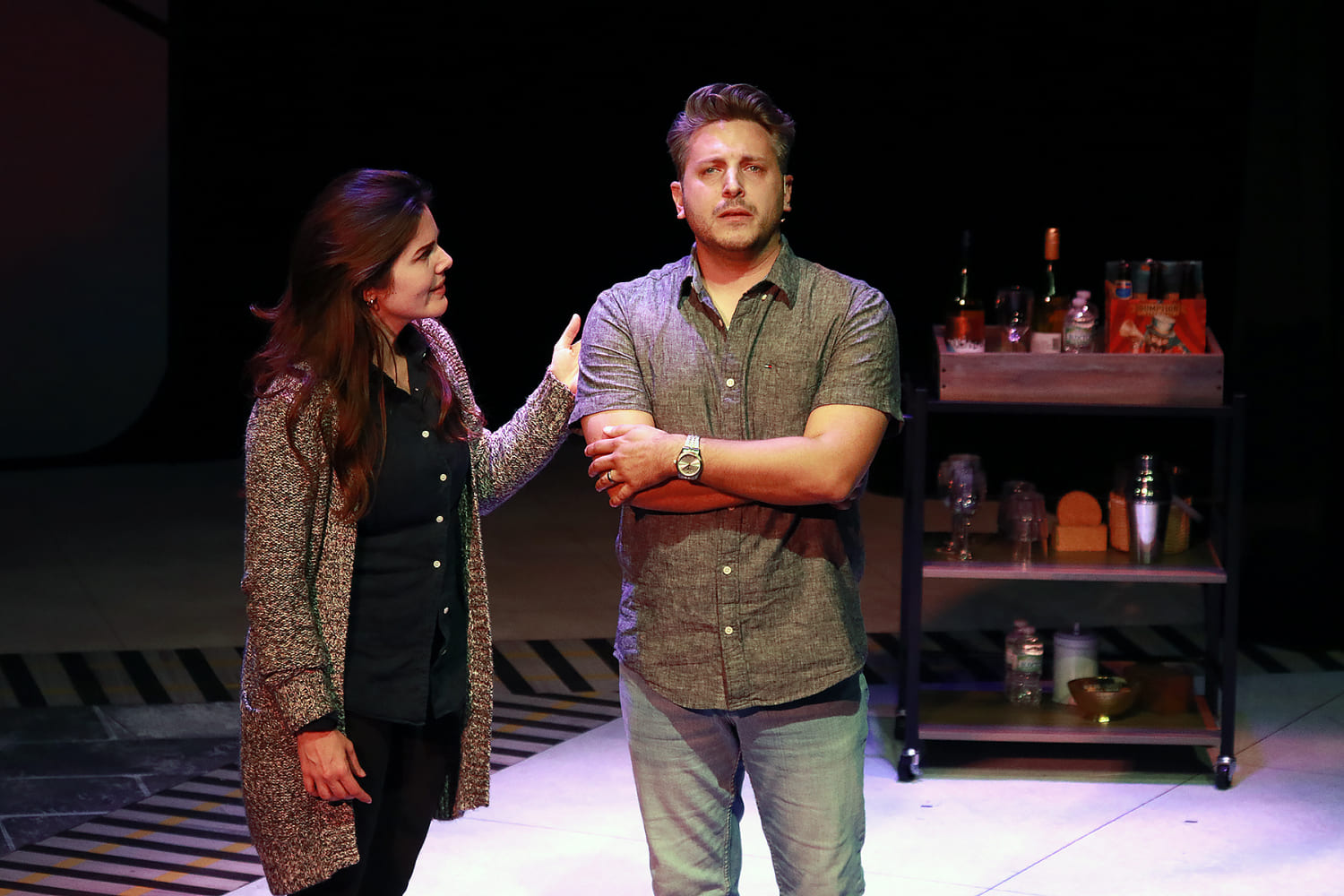
Tom Watson (Iain Batchelor) gets down on Rachel Watson's (Gaby Tortoledo) level. (Photo by Alberto Romeu)
In Actors’ Playhouse at the Miracle Theatre’s gripping professional production of Paula Hawkins’ blockbuster bestseller "The Girl on the Train," the intermission arrives at just the right moment. At the end of the first act, a detective reveals game-changing information. Dramatic music plays immediately after the announcement, and then the lights come up to indicate the break. The timing is impeccable — by then, we are fully hooked and eager for the action to continue.
This well-placed intermission is just one of many bright spots in the roughly two-hour-and-10-minute production (including a 15-minute intermission), now running through Sunday, June 8 in the company’s intimate, 300-seat upstairs Balcony Theater in Coral Gables.
Under the fast-paced, attentive direction of Artistic Director David Arisco, the production features a cast of talented performers, many of whom will be familiar to South Florida audiences. The ensemble includes Gaby Tortoledo, Krystal Millie Valdes, Allie Beltran, Iain Batchelor, Ryan Didato, Nate Promkul, Gregg Weiner, and Lennox Batchelor as the voice of the child.

Tom Watson (Iain Batchelor) tries to help a dazed Rachel Watson (Gaby Tortoledo). (Photo by Alberto Romeu)
Before the reviewed performance began, a telling moment occurred: When Arisco asked the audience how many had read Hawkins’ mega-popular novel, many hands shot up. Perhaps you are among them. "The Girl on the Train" has sold more than 20 million copies globally, making it one of the best-selling adult fiction books in recent memory. It has also received multiple literary awards.
Part of what has endeared so many to the story is Hawkins’ use of an unreliable narrator. Like Rachel, we are not sure who or what to believe. Also, Rachel’s fantasy about the “perfect couple” mirrors how people often cope with loss and loneliness and feel that the “grass is always greener” elsewhere. But “The Girl on the Train” makes us wonder whether that is true.
Fans of the novel can rest assured: Rachel Wagstaff and Duncan Abel’s stage adaptation is mostly faithful to Hawkins’ original work. For instance, the play preserves the novel’s British modern-day setting (unlike the 2016 film, which relocates the story to New York). All the major characters remain, and the core storyline — part mystery, part psychological thriller — is intact.
As in the book and film, Rachel Watson, is devastated by a recent divorce and job loss. In a daily alcoholic stupor, she numbly rides the train, fantasizing about the seemingly perfect couple she glimpses from her window. One day, she sees something from the train, and as she investigates, she finds herself increasingly entangled in the mystery surrounding the couple and their secrets.
This production leans into the psychological tension with cinematic fluidity and unsettling sound design. Credit sound designer Reidar Sorensen, whose work includes the loud, realistic sounds of trains speeding by — noises that seem to echo the chaos within Rachel’s alcohol-fueled psyche. At times, the unnerving juxtaposition of an innocent child’s voice and jarring sound effects create a lingering discomfort, mirroring the emotional unease driving the play.

D.I. Gaskill (Gregg Weiner) questions a flustered Rachel Watson (Gaby Tortoledo). (Photo by Alberto Romeu)
We must also credit lighting designer Eric Nelson. For instance, his dim lighting creates just the right ambience for romantic scenes. Also, his use of hues, such as red and pink, reinforce non-realistic and highly charged moments. In addition, fluid lighting changes accompany flashbacks.
Brandon M. Newton’s scenic design is, for the most part, telling. When we enter the theater, we see what resembles train tracks. In front of the tracks are liquor bottles. Meanwhile, on another part of the set, we see what resembles a painter’s environment. One scenic element that is less clear looks like an oversized cellphone resting on its side. However, its exact purpose remains unclear.
The set mostly remains fixed, allowing the action to proceed generally uninterrupted. As a result, we concentrate on the story and characters.
Speaking of the characters, the actors, wearing Ellis Tillman’s fittingly dark costumes, believably bring them to life as flawed yet relatable and complex individuals during an emotional time. Also, the performers speak in a believable proper British accent.
Fight director Lee Soroko has deftly choreographed physical scenes so that they look believable while keeping the performers safe. And intimacy director Nicole Perry has helped make romantic moments convincing.
With credible unsteadiness, a dazed look, and a nervous disposition, Tortoledo deftly conveys Rachel’s fragile emotional state. Sometimes she runs her hand through her long, dark hair, suggesting, perhaps, that Rachel is overwhelmed. In addition, she sounds incoherent at times, as though she has had too much to drink. Also, unquestionably, Rachel’s vulnerability shines through as Tortoledo skillfully portrays her. But she is also believably assertive at appropriate times.
By contrast, Valdes imbues Anna with a calm and innocent demeanor. There is strong chemistry between Valdes’s Anna and Batchelor’s Tom.
Batchelor carries an air of authority as Tom. But though the character can be sharp, the performer also injects his character with a sympathetic tone at times. While he may be frustrated with Rachel’s re-entry into his life, we hear how he calls his former wife “Rach.” Clearly, a hint of Tom’s former affection for Rachel lingers.

Rachel Watson (Gaby Tortoledo) consoles a troubled Scott Hipwell (Ryan Didato).
Didato, whose vivid portrayal as Katurian in Zoetic Stage’s mesmerizing production of “The Pillowman” was visceral, does equally fine work here as Scott Hipwell. He makes him a nervous, impulsive bloke who seems lost and lonely after his wife goes missing. As Didato portrays him, you may fear Scott and even suspect him of harming his wife. But you also feel for him. Once again, Didato delivers an emotionally-layered performance.
In contrast to Didato’s intense and aggressive Scott, Promkul lends Megan’s psychiatrist, Kamal Abdic, an air of cool calm and polish. Promkul’s understated, reassuring portrayal makes it clear that this man is an experienced professional. And you doubt whether authorities should suspect Abdic in Megan’s disappearance. In the play, one of the authorities is D.I. Gaskill. Weiner portrays him as a no-nonsense, somewhat cynical cop bent on arriving at the truth.
Megan, whom Beltran portrays with flair, is more a figure of memory and mystery than a fully present character. Still, the performer gives us glimpses of a person wedged between secrecy and sorrow.
In addition to portraying Megan, Beltran is the production’s fight captain. That means she helps the fight director maintain the integrity and safety of the fight choreography.
While Rachel spends much of the play adrift, by the end she seems steadier — ready to move beyond the wreckage of her past. And if you, too, are looking for a reset, Rachel’s journey might steer you in the right direction.
IF YOU GO
WHAT: “The Girl on the Train.”
WHEN: Through Sunday, June 8. Performances are 8 p.m. Wednesday through Saturday and 3 p.m. Sunday. A pre-show happy hour takes place from 6:30 p.m. to 7:30 p.m. every Thursday.
WHERE: The Miracle Theatre, 280 Miracle Mile, Coral Gables.
TICKETS: $40-$80 (10 percent discount for seniors on weekdays and $15 student rush tickets available 15 minutes prior to curtain).




